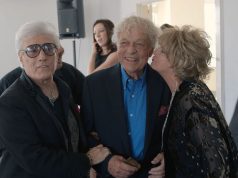
I didn’t grow up with “Mister Rogers’ Neighborhood” (or “Sesame Street,” for that matter). We didn’t have cable yet when I was that age, and our TV antenna didn’t pick up the local PBS affiliate. Yet even without a personal connection or a sense of nostalgia, I had a lump in my throat for most of “Won’t You Be My Neighbor?,” a lovely documentary about Fred Rogers and his gentle, monumental creation. Turns out the story of a fundamentally decent man who dedicated his life to helping children feel loved has universal appeal, whether you ever saw his show or not.
Director Morgan Neville, who’s mostly made music documentaries before (including the Oscar-winning “20 Feet from Stardom”), has interviews with Rogers’ widow and sons, and with cast and crew members who worked with him for years. Besides clips from the show itself, there’s ample behind-the-scenes footage that shows Rogers being as kind and unflappable off the air as he was on. I love the anecdote shared by a prank-loving crew member who used to take pictures of his own bare butt when nobody was looking, as a surprise for whoever developed the film. On the man’s birthday, Rogers — who kept things G-rated himself but wasn’t too prudish to appreciate bawdier expressions of camaraderie — presented him with a poster-size blow-up of one of those moon shots.
Neville’s focus is on Mister Rogers the TV personality, so we don’t get a lot of insight into his childhood. Whatever made him the way he was (his own parents must have played a significant role), it’s not explored. But we see plenty of evidence of his consistent humility and goodness, his “abiding interest in children,” and his life’s philosophy: “You don’t have to do anything sensational for people to love you.” The film briefly addresses the urban legends — no, he wasn’t a military sniper; no, he wasn’t secretly gay; no, he wasn’t offended by parodies unless they mocked his philosophy — but it’s more interested in showing examples of the goodwill he engendered.
It also reveals the origins of many elements of the TV show (some of which might already be common knowledge, I suppose). It’s interesting to me that while Fred Rogers provided the voices for most of the characters in the Neighborhood of Make-Believe, Mister Rogers only ever appeared in the “real” neighborhood — he didn’t want young viewers to be confused about whether he was “make-believe.” By all accounts he was not. “Won’t You Be My Neighbor?” offers a chance to sit in a cool, dark room for 90 minutes and smile and weep over a man who inspires us to be better, and to be reminded of the goodness in the world. By the end, everyone onscreen is crying, too.
B+ (1 hr., 34 min.; )





